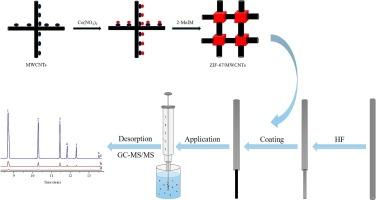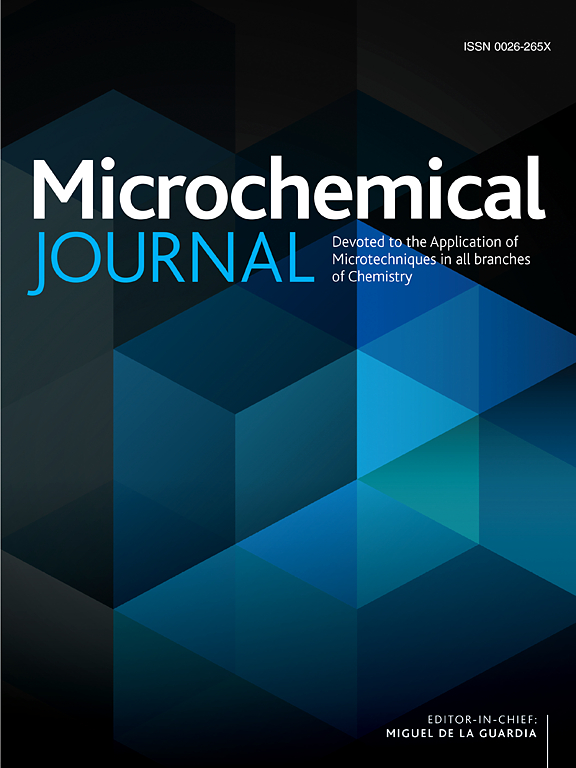Application of 3D structure of carbon nanotube-interwoven metal–organic frameworks in solid-phase microextraction of trace polychlorinated biphenyls from tea beverages
IF 4.9
2区 化学
Q1 CHEMISTRY, ANALYTICAL
引用次数: 0
Abstract
A three-dimensional (3D) structure of multiwalled carbon nanotubes (MWCNTs) interwoven metal–organic frameworks (MOFs) was synthesized. The MWCNTs was utilized to bridge the neighboring MOF nanocrystals. The hybrid material MOFs/MWCNTs was used for SPME coating to extract six PCBS in tea beverages samples by gas chromatography coupled to tandem mass spectrometry. MOFs/MWCNTs coating materials were characterized by thermogravimetric analysis (TGA), scanning electron microscopy (SEM), Fourier transform infrared spectroscopy (FTIR), X-ray diffraction (XRD) and N2 adsorption–desorption analysis. The response surface method was utilized to systematically optimize the main extraction factors. Under the optimized conditions, the developed method demonstrated wide linear ranges (0.01–1000 ng·L−1), low limits of detection (0.003–0.009 ng·L−1) and high enrichment factors (701–2361) for extracting and determining six PCBS. The six PCBS concentration in environmental tea beverages samples was detected with this method. These results display that MOFs/MWCNTs hybrid materials are potential sorbents in the SPME of PCBS in environmental tea beverages samples.

碳纳米管交织金属有机框架三维结构在茶饮料中痕量多氯联苯固相微萃取中的应用
多壁碳纳米管(MWCNTs)交织金属有机框架(MOFs)的三维(3D)结构被合成出来。多壁碳纳米管被用来桥接相邻的 MOF 纳米晶体。将 MOFs/MWCNTs 混合材料用于 SPME 涂层,通过气相色谱-串联质谱法提取茶饮料样品中的六种 PCBS。通过热重分析(TGA)、扫描电子显微镜(SEM)、傅立叶变换红外光谱(FTIR)、X射线衍射(XRD)和N2吸附-解吸分析对MOFs/MWCNTs涂层材料进行了表征。利用响应面法对主要萃取因子进行了系统优化。结果表明,在优化条件下,所建立的方法萃取测定6种PCBS的线性范围宽(0.01~1000 ng-L-1),检出限低(0.003~0.009 ng-L-1),富集因子高(701~2361)。该方法检测出了环境茶饮料样品中六种 PCBS 的浓度。这些结果表明,MOFs/MWCNTs 杂化材料是环境茶饮料样品中 PCBS SPME 的潜在吸附剂。
本文章由计算机程序翻译,如有差异,请以英文原文为准。
求助全文
约1分钟内获得全文
求助全文
来源期刊

Microchemical Journal
化学-分析化学
CiteScore
8.70
自引率
8.30%
发文量
1131
审稿时长
1.9 months
期刊介绍:
The Microchemical Journal is a peer reviewed journal devoted to all aspects and phases of analytical chemistry and chemical analysis. The Microchemical Journal publishes articles which are at the forefront of modern analytical chemistry and cover innovations in the techniques to the finest possible limits. This includes fundamental aspects, instrumentation, new developments, innovative and novel methods and applications including environmental and clinical field.
Traditional classical analytical methods such as spectrophotometry and titrimetry as well as established instrumentation methods such as flame and graphite furnace atomic absorption spectrometry, gas chromatography, and modified glassy or carbon electrode electrochemical methods will be considered, provided they show significant improvements and novelty compared to the established methods.
 求助内容:
求助内容: 应助结果提醒方式:
应助结果提醒方式:


